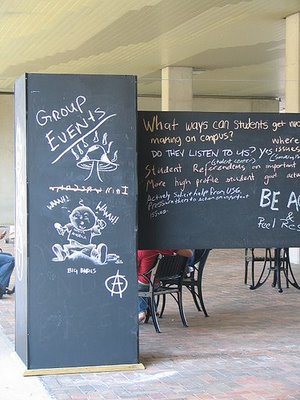When: Monday, September 18, 12:15 PM – 1:00 PM
Where: Democracy Plaza, IUPUI campus breezeway adjacent to University Library
The First Amendment grants a very broad freedom of speech, including the right to proclaim falsities as truth and to denounce those who disagree with us as evil. Within the academic community, slightly different parameters apply. “Liberal” speech is informed by consideration of multiple points of view, and is free speech of a particular sort. It entails both constraints (such as the rules of logic or scientific inquiry), and protections (such as tenure, which prevents a faculty member from being fired because of his/her political views). How can these very different notions of “free speech” be reconciled?
Leading this discussion will be a favorite of civic groups throughout the area, Susan Erickson, a Trustees' Lecturer of Political Science at IUPUI. She teaches courses about the news media and politics, gender and sex roles, and the real and manufactured world of conspiracies. Freedom of speech lies at the heart of many of her courses, which deal with such issues as freedom of the press and the use of speech by militant, extremist, and fringe religious groups.
For more information ... Want some basic background on some of today’s hotly debated questio
 ns of freedom of academic speech? Kermit Hall gives a college president’s perspective on “Free speech on public college campuses,” along with helpful background information from the First Amendment Center. Richard Just provides a useful map in “Schools of thought: The liberal-conservative divide on college campuses.” For a Hoosier perspective, check out IU Prof. Robert Ivie’s “Academic Freedom and Political Heresy.”
ns of freedom of academic speech? Kermit Hall gives a college president’s perspective on “Free speech on public college campuses,” along with helpful background information from the First Amendment Center. Richard Just provides a useful map in “Schools of thought: The liberal-conservative divide on college campuses.” For a Hoosier perspective, check out IU Prof. Robert Ivie’s “Academic Freedom and Political Heresy.”After the Democracy Plaza event, you’ll want to read a book or two. Free Speech in the College Community by Robert O’Neil is a good place to start, as is Martin Golding’s Free Speech on Campus. For a nice collection of essays from diverse perspectives, check out the volume edited by Peggie Hollingsworth, Unfettered Expression: Freedom in American Intellectual Life.
Susan Erickson credits her understanding of the social forces in America that shape the debate over freedom of academic inquiry and expression to Garry Will’s A Necessary Evil: A History of American Distrust of Government, and to Richard Hofstadter’s classic “The Paranoid Style in American Politics.”
Many groups devote themselves to preserving academic freedom … although they often disagree strongly about the sources of threats to those freedoms. Some, such as Students for Academic Freedom, wave their political agendas proudly. The Foundation for Individual Rights is less shrill. More balanced is the American Association of University Professors, which provides a helpful collection of documents on academic freedom.
About the venue: The Democracy Plaza at Indiana University Purdue University Indianapolis was created with the purpose of providing students, faculty, and staff with an opportunity to express, speak, and hear diverging thoughts surrounding social, political, economic, and religious issues relevant to the campus, city, state, country, and world. The project was started in the summer of 2004 when a group of students, faculty, and staff at IUPUI worked together to address the benefits and drawbacks of a physical structure outside of the traditional walls of academia that would seek to host a common area for students, faculty, and staff across the array of disciplines.
If you like this event ... You should check out some of the other MDC events addressing free speech issues. Art Farnsley comes to the Democracy Plaza the next day to discuss fears that free speech might hurt. Later in the week, learn about today's news media and the First Amendment. And there will be a special discussion of how much protection the speech of kids is given.
To return to the IndyBuzz schedule of My Daily Constitution events, click here.
Return to Navigating IndyBuzz in September
No comments:
Post a Comment